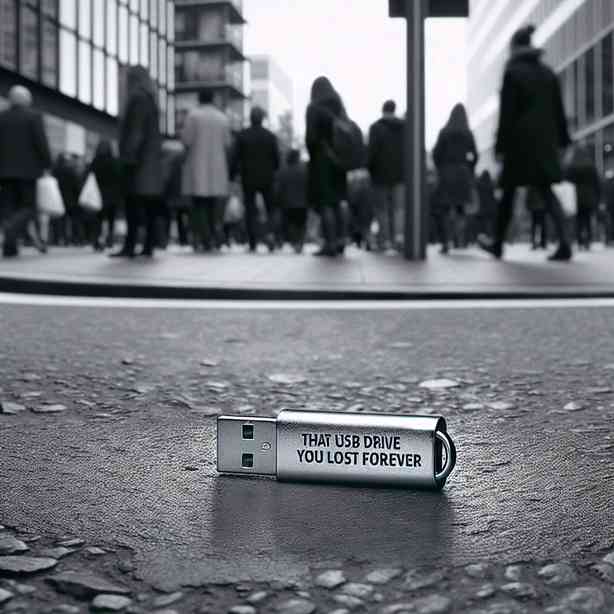
The USB Drive You Lost Forever
In the modern age, the USB drive has become an essential tool for data storage and transfer. Its compact size, portability, and ease of use make it an ideal option for both personal and professional purposes. However, the unfortunate reality is that many of us have experienced the loss of a USB drive, often leading to the dreaded feeling of losing important files, irreplaceable memories, or even sensitive information. Throughout this article, we will explore the significance of USB drives, why they are so easy to misplace, the potential consequences of losing one, and what steps you can take to minimize the risks associated with USB drive loss.
To begin with, it is essential to understand the widespread adoption of USB drives in our daily lives. They serve multiple purposes, from transferring work documents between home and the office to storing cherished family photos. With advancements in technology, these small devices now offer massive storage capacities, allowing users to carry thousands of files in their pockets. As convenient as they are, this ease of use can also lead to careless habits, such as leaving a USB drive plugged in at a coffee shop or misplacing it in a bag filled with other items. In essence, the very qualities that make USB drives appealing can also contribute to their loss.
Moreover, the nature of USB drives—small and often not easily distinguishable from other similar devices—means they can vanish without a trace. When combined with our fast-paced lifestyles, it’s no wonder that many people have experienced the frustration of losing a USB drive, sometimes without even realizing it until it’s too late. You might be reminded of that time you hurriedly changed bags or left a public place without taking a moment to check for your essential items. Each instance only adds to the alarmingly high statistics surrounding USB drive loss.
The consequences of losing a USB drive can be quite severe, depending on what was stored on it. For many, the loss may include important work files that cannot be recreated easily, leading to missed deadlines and lost productivity. For others, it can mean losing precious family memories captured through photos and videos that may never be recoverable. Additionally, if sensitive information, such as personal identification details or financial information, is stored on a lost USB drive, it can pose a risk not only to the individual but to others as well if that data falls into the wrong hands.
In this digital era, data security is more important than ever. Losing a USB drive can lead to data breaches, identity theft, or even fraud. This risk extends not only to the user but to clients, coworkers, and family members whose information could potentially be exposed. Unfortunately, many individuals do not realize that failing to take necessary precautions with USB drives increases their vulnerability to cyber threats and minimizes their personal security.
Moving forward, it is vital to take proactive measures to safeguard your USB drives and their contents. One suggestion is to encrypt the data stored on the USB drive. Encryption converts your data into a format that can only be read with a specific key or password. By implementing encryption, you help ensure that unauthorized individuals cannot access your information, even if they find your lost drive. Using strong passwords and keeping them confidential is equally important in strengthening data security.
Another strategy is to utilize cloud storage solutions in tandem with USB drives. While USB drives are excellent for temporary data storage and transfer, cloud service providers, such as Google Drive, Dropbox, or OneDrive, can serve as a reliable backup option. This way, even if your USB drive is lost forever, you will still have access to your critical files on the cloud. Moreover, cloud platforms often come with features that allow for easy file sharing and collaboration, enhancing your workflow efficiency overall.
Additionally, cultivating a habit of regularly backing up your USB drive’s contents can also mitigate the consequences of a loss. Schedule periodic backups to an external hard drive or a cloud service so you have access to the latest versions of your documents. By establishing a robust data management routine, you can minimize the adverse effects of losing your USB drive.
Organization plays a crucial role in reducing the likelihood of misplacing your USB drive. Designate a specific spot in your home or your bag for your USB drive, ensuring it has a consistent and recognizable location. Make it a habit to check for your USB drive before leaving unfamiliar places, and consider attaching it to a lanyard or keychain to enhance its visibility. Small changes in your daily routine can make a world of difference in keeping track of your essential items.
In conclusion, while it may be easy to overlook the importance of USB drives in our daily lives, we must recognize the potential risks and take the necessary steps to protect our valuable information. Understanding why USB drives are commonly lost can help us develop strategies to safeguard these devices. Implementing data security measures, utilizing cloud storage, establishing organization tactics, and prioritizing regular backups will not only minimize the consequences of a lost USB drive but also contribute to an overall sense of security and control over our information. In a world where data is increasingly becoming a key resource, ensuring its safety is more important than ever. With simple changes in habits and practices, we can significantly reduce the chances of losing that USB drive you might have thought you lost forever. Taking these measures empowers you to handle your data with greater confidence, knowing that you have put in place systems to protect it, ensuring that your experience with USB drives remains a positive one.


